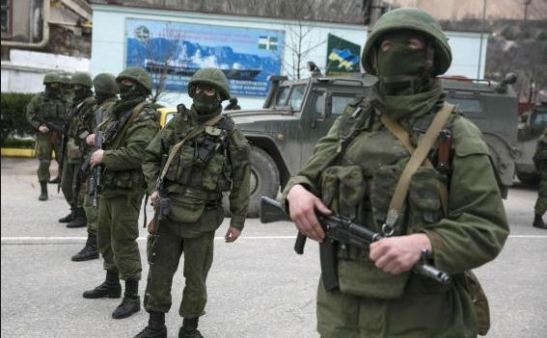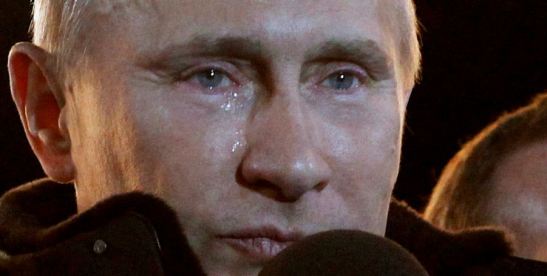The Crimean Anschluss: the Dangers of Putinism, Part 2
A week ago I posed the question, if Russia was prepared to spend $ 51 billion on a TV show aimed largely at a domestic audience, what might it invest in something serious? This weekend we are finding out that Vladimir Putin will bet rather a lot if the odds are in his favour.
Easy conquests are the hardest ones to resist, because they seem so inevitable. When his Olympics ended, Hitler waited over a year before inhaling Austria and then the Sudetenland territory of Czechoslovakia (both areas with substantial German-speaking populations and with some strategic and economic value to the Third Reich). Putin waited one week after Sochi before pouncing on the Crimean peninsula.
Crimea is a complicated place and complicated issue. Its population is predominantly Russian in its ethnicity and home language; its territory has historically been part of Russia, now and then. Russia’s only Mediterranean naval base sits at Sevastopol, on the southwest tip of the peninsula. The Russians have a strong historical and geopolitical interest in preserving a presence in Crimea. It is very likely that a majority of the people living in Crimea would accept either a local nation state dominated by ethnic Russians or absorption into the Motherland itself.
None of that justifies a Russian incursion across sovereign borders. The ethnic Russians of Crimea were no more at risk than the ethnic Germans of the Sudetenland in 1938: it is transparently bogus for anyone to paint the Russian invasion as anything other than what it is: an invasion. There are plenty of Mexicans in California but if the Mexican army crossed the border and seized San Diego, no-one would countenance it. Ethnic affiliation is not a license to cross borders.
Just as important as the Ukraine’s boundaries are the world’s boundaries – if Putin can cross this line just because there are ethnic Russians and a naval base in Crimea, what limits (if any) exist? The pretexts for going into the Crimea are far weaker than the reasons why it will succeed: because the Russians have more armaments. That is why they will win there. But we have some rules on this planet, including some which say that having more guns than your neighbour does not give you the right to take their land. That rule is being violated this morning.
 Anyone who has studied history knows what it means when an aggressive, dominant military bully is permitted to push its way into neighbouring territories: small countries are like potato chips – you don’t eat just one. This is not about the Crimea. Doubtless Putin originally expected to consolidate his grip on the Ukraine through a friendly regime. The move into Crimea, which seems almost a fait accompli, should not be seen as an isolated action intended just to secure Russian interests on the peninsula. It is what it is: a step towards Kiev and the installation of another Russophilic stooge like Yanukovich into control over all of the Ukraine. And it is a message to countries within reach of Russia, that their autonomy is at risk.
Anyone who has studied history knows what it means when an aggressive, dominant military bully is permitted to push its way into neighbouring territories: small countries are like potato chips – you don’t eat just one. This is not about the Crimea. Doubtless Putin originally expected to consolidate his grip on the Ukraine through a friendly regime. The move into Crimea, which seems almost a fait accompli, should not be seen as an isolated action intended just to secure Russian interests on the peninsula. It is what it is: a step towards Kiev and the installation of another Russophilic stooge like Yanukovich into control over all of the Ukraine. And it is a message to countries within reach of Russia, that their autonomy is at risk.
So what? Russia is a vastly wealthy and heavily-armed country rapidly sliding away from its own democracy into another kleptocratic autocracy. Putin already has boots on the ground in Crimea, boots he is prepared to seen blown off the sons of Russia as part of a geo-political gambit to secure a wider sphere of influence and economic hegemony. Who is ready to stop him? Is the EU or NATO or the USA supposed to step up militarily to push the Russian Army back? Almost everyone will say “no” to that, just as I would if asked the question “are you prepared to send a Canadian soldier to defend the Crimea?”
The problem here, of course, is that we wouldn’t be defending Crimea (the people there see Putin as a liberator, not a conqueror). Nor would we be simply defending the Ukraine. We would be defending a string of vulnerable countries, primarily those which have opted out of the old Soviet orbit and by extension, defending ourselves and some principles which might be important.
One rule in life is that fights are won by the people who are prepared to get their noses bloodied and that fights are lost – always lost – by those who are not. Indeed, if you aren’t willing to fight, you lose twice: by surrendering your ground quickly and by not weakening your adversary. And there is a third risk: stepping backwards from a bully teaches that bully one thing: take another step forward. This is what Putin is now testing. If the nations of the west make soft mouthings about Ukrainian sovereignty while acquiescing to the Anschluss in the Crimea, valuable lessons will be learned in Moscow (we can take what we want) and in every country bordering Russia (we can be taken and no-one will save us).
I don’t think that anyone other-than the fragile Kiev government will mobilize soldiers to resist the Russian conquest of Crimea. I don’t know if anyone else’s soldiers should be climbing onto trucks, ships and planes today in preparation for a stand-off. I only know one thing: if someone doesn’t do something real now, we will be doing something real later, somewhere else. The Russian dictator needs to feel the heaviest slap in the face, short of war, that can be delivered, so that he and his coalition of Mafiosi, ex-KGB and nationalists understand that there is a real price to be paid for breaking the rules.
That is the only thing a bully ever understands.


Very good analysis, even predicting the next step forward. Russia’s trespassing of the Budapest memorandum, UN charter, and Helsinki Accord have hastened its path to rogue status.
LikeLike
Pingback: The private life is dead in Russia | Think Anew, Act Anew